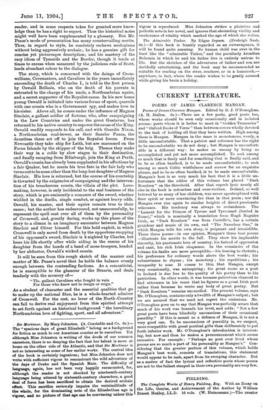CURRENT LITERAT URE.
POEMS OF JAMES CLARENCE MANGAN.
Poems of James Clarence Mangan. Edited by D. J. O'Donoghne. (A. H. Bnllen. 6s.)—There are a few poets, good poets too, whose works should be seen only occasionally and in isolated
poems: poets whom it is better to meet in "Golden Treasuries" and" Oxford Books of Verse" than between covers wholly devoted to the task of holding all that they have written. High among these is Mangan. Mangan in the mass is monotonous, wordy, a little uncomfortable. That a patriot and reformer has the right to be uncomfortable we do not deny ; but Mangan is uncomfort, able in a different way: he makes us uneasy by being so accomplished and yet not more accomplished. To seek among so much that is finely said for something that is finally said, and to be so often baulked, is to be made uncomfortable ; to seek among so much Celtic wistfulness and sorrow for an exquisite
phrase, and to be so often baulked, is to be made uncomfortable. Mangan's best is so very much his best that it is a little un- fortunate that the editor of this volume has placed "Dark Rosaleen" on the threshold. After that superb lyric nearly all else in the book is colourless and over-written. Ireland, so well beloved by so many of her children, was never apostrophised with finer spirit or more convincing fire than in that poem ; nor did Mangan ever rise again to similar heights of direct passionate utterance. His tendency was always to redundance. The " Lament for the Princes of Tyrone and Tyrconnel (buried in Rome)," which is nominally a translation from Hugh Maguire Irish, as "Dark Rosaleen" was from Costello's, has a certain grandeur and music of its own, and "The Nameless One," in which Mangan tells his own story, is poignant and irresistible. These three poems—in our opinion, Mangan's three best poems —illustrate his merits to the full. They show his implacable sincerity, his passionate love of country, his hatred of oppression and cant, his rich Irish eloquence. In the remainder of the volume his faults are more perceptible,—his leaning to rhetoric ; his preference for ordinary words above the best words ; his subservience to rhyme ; his monotony ; his repetitions ; his incapacity to soar. It comes to this, that Mangan, exoept very occasionally, was uninspiring; his great name as a poet in Ireland is due less to the quality of his poetry than to his patriotism. In other words, it was because patriotism chanced to find utterance in his verse that he figures as a great Irish poet rather than because he wrote any body of great poetry. But "Dark Rosaleen" remains unexcelled. The present volume, says Mr. O'Donoghne, contains only &twelfth of Mangan's output; but we are assured that we need not regret the omissions. Mr. O'Donoghue goes on to say that Mangan was perfectly aware that much of his work was beneath his level, and adds: "Not a few great poets have been blissfully unconscious of their occasional puerility." If this is meant as a defence of Mangan, it is not a very good one. To be unconscious of puerility is, we suspect, more compatible with great poetical gifts than deliberately to put forth inferior work. Mr. O'Donoghne's introduction is interest- ing, but now and then he makes a pronouncement which seems excessive. For example : "Perhaps no poet ever lived whose poems are so much a part of his personality as Mangan's." Con- sidering that the greater portion of this volume, which hold* Mangan's best work, consists of translations, this statement would appear to be rash, apart from its sweeping character. But as a matter of fact the lyrical and reflective poets whose poems are not to the fullest steeped in their own personality are very few.










































 Previous page
Previous page